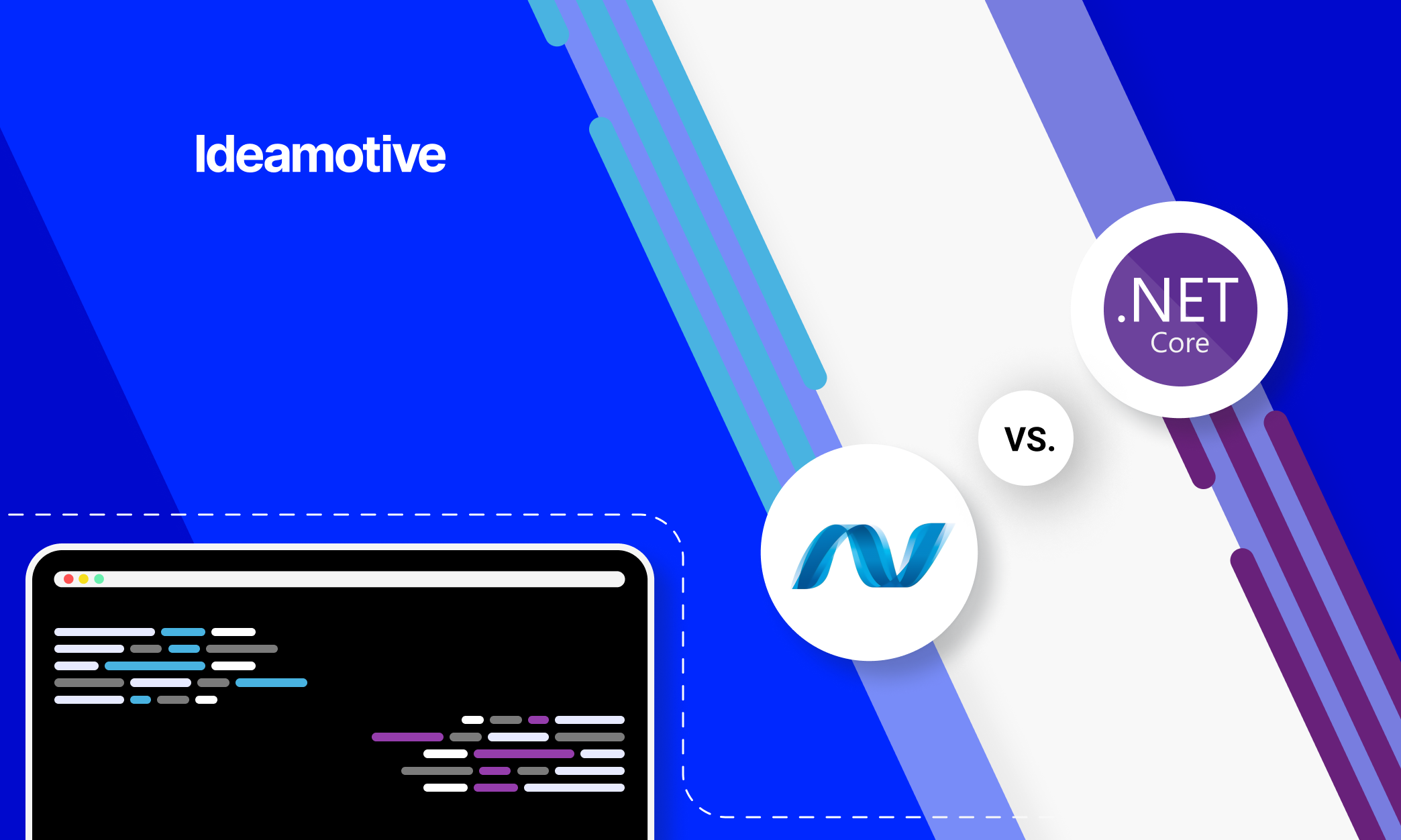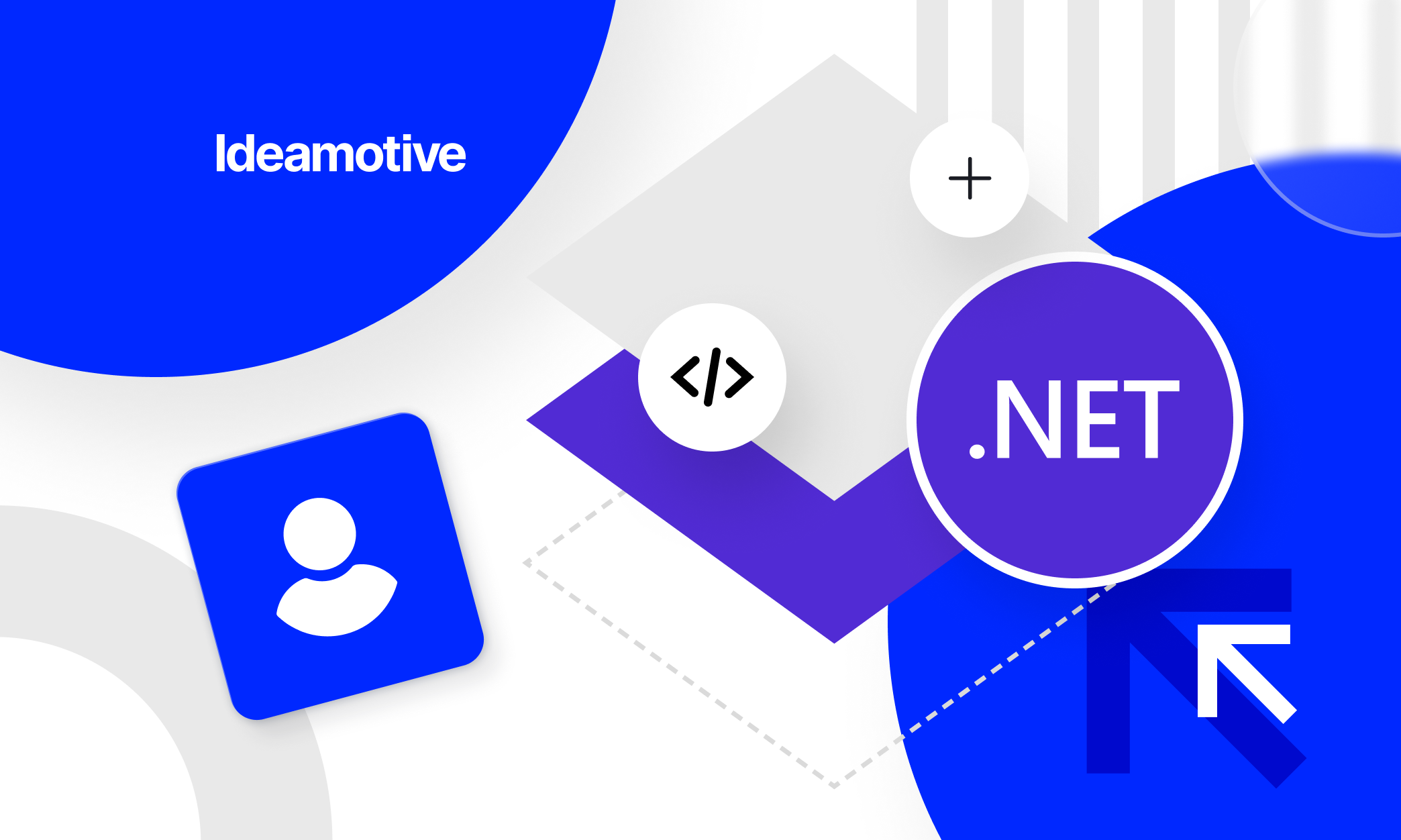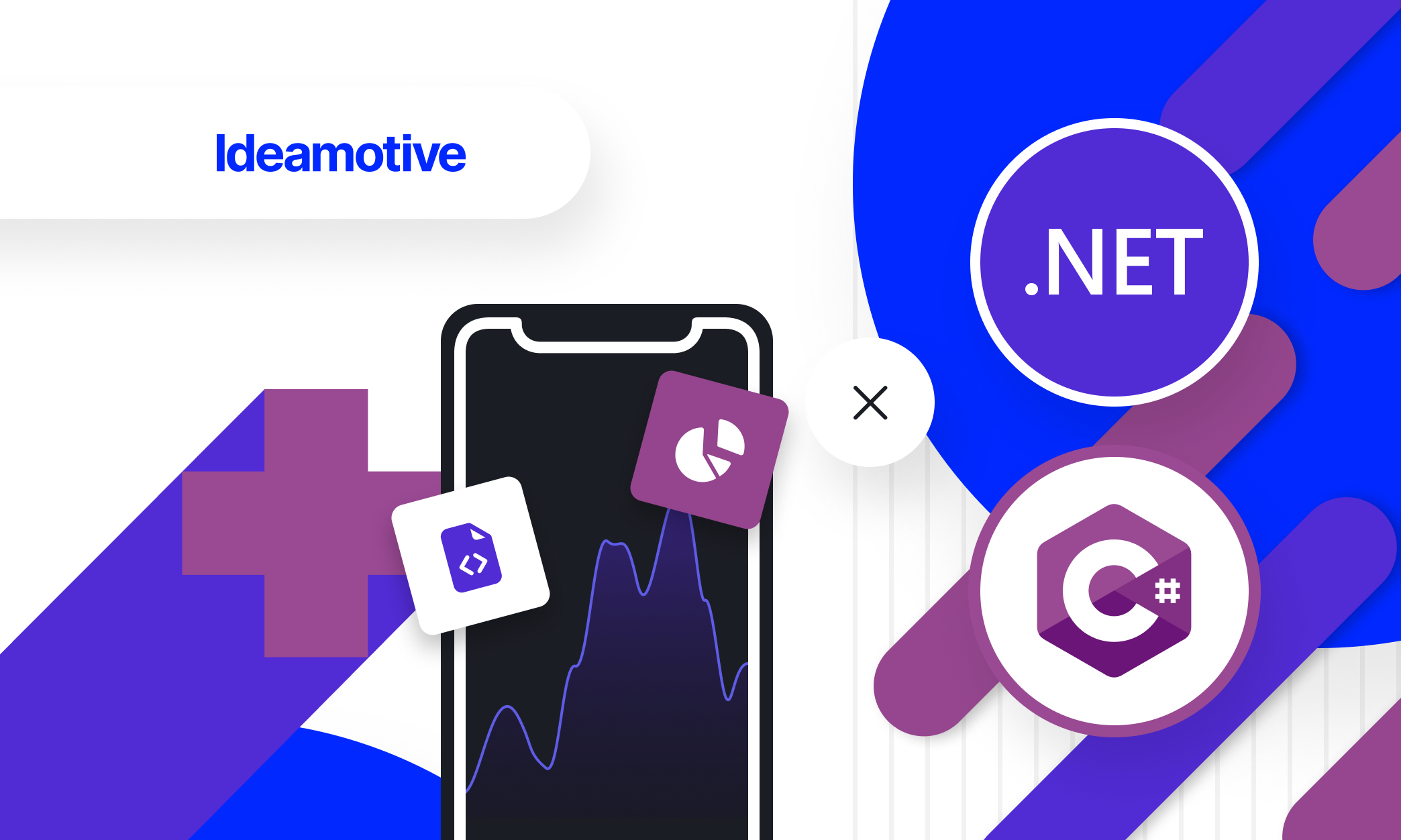Hire .NET Developers, Engineers and Consultants
Matched with your industry, project and company culture.
Our rating on
Delivering exceptional .NET talent swiftly and smoothly.
Diverse Source of Talent
- Talent Network of vetted freelancers
- Top software companies from the CEE region
- Ideamotive's core .NET team
Streamlined Hiring Process
- Only pre-vetted talent and trusted partners
- Experts matched with your industry, company culture and project type
- Shortlist of talent in under 24 hours
Ultimate Business Support
- Your dedicated Talent Specialist
- Payments, insurance, legal and admin taken care of and combined under one invoice per month
- Talent management and performance reporting during the entire collaboration
Startups, scale-ups and enterprises build their teams with Ideamotive






How to hire .NET developers with Ideamotive
Tell us about your business requirements
Talk to our advisor about your exact needs, product specifics and team dynamics. The more we know at this step, the better the future match will be.
Get the shortlist of talent in under 24 hours
Based on the interview, we will shortlist .NET developers best suited for your needs.
Hire and onboard with a money-back guarantee
We will onboard the talent and take care of all payments, insurance, reporting and other dull processes. There is also a 7-day money-back guarantee after the project's kick-off.
We’ve been extremely satisfied. We work with multiple partners, but they’re our main supplier because of the quality of their work.

Håkon Årøen
Co-founder & CTO of Memcare
Ideamotive has a huge pool of talent. Don’t just settle for someone: find a person who understands your project and has the competencies you need.

Julian Peterson
President, Luminate Enterprises
They understand and navigate the industry to deliver an outcome that will truly stand out. Despite a heavily saturated market, they’ve delivered creative solutions that I haven’t seen before.

Adam Casole-Buchanan
President, Rierra INC
They are very flexible, providing a team of developers on short notice and scaling the size as needed. Their team meets tight deadlines, including some that only give them a few hours to do the work.

Sylvain Bernard
Event Manager, Swiss Federal Institute of Technology Lausanne
Our Software Development Success Stories
JRPass: optimizing a booking system for the Japanese railway network
Read the story of how we combined our business expertise with outstanding web development to increase conversion rates and boost sales.

Our project manager had things taken care of and their backend developers had great technical abilities. They’ve been the best we’ve had so far!
Daniel de Nieuwe, Senior Product Manager, JRPass.com
Close
TRAVELDUCK: building a marketplace for boutique adventure trips and activities
How we created a fully functional digital marketplace from scratch and helped the client validate the business model to scale up.

They took a very progressive approach to our needs!
Peter Grabo, Founder of TravelDuck
Close
When should you be looking for .NET developers?
When focusing on Windows
If you are targeting Windows users with your app, the .NET framework should be the first one to consider. Developed by Microsoft themselves, .NET gives you all the tools to create software that performs well on every Windows-based PC.
When building complex software
The .NET environment is commonly used when developing more complex software, like business tools, video games, cloud apps and AI. By implementing the framework, .NET developers can make your program perform better than when using other solutions.
When running operations on big data sets
Getting data to and from the user, storing data, establishing a complex data pipeline — all these things can be done fast and in a secure way by .NET developers. If numbers are important at your company, .NET is the perfect way to handle them.
When in need of a scalable solution
A product based on .NET can run great no matter the scope of the project. The framework can be introduced in the early days of a company and continue being used as the business grows.
Ideamotive's guide to hiring a .NET developer — what you need to know.
With so many different technologies used for web development, choosing one can be difficult. What’s more, some of these technologies are better for the back-end of the website, while others are mainly used for the front-end, the part of the site or app the user actually sees. This means that, ultimately, you need to adopt multiple technologies for various parts of your app.
Microsoft’s .NET framework (often referred to also as “dot net”) is an environment that helps simplify things and keeps everything in one place. While .NET developers work on multiple different types of projects, from desktop tools for Windows to AAA video games to artificial intelligence software, some of them focus on working with ASP.NET — the .NET framework dedicated to building beautiful, dynamic websites, web apps and web services.
With ASP.NET, dot net developers can work on both the front-end and the back-end of your web product within one environment, while still using all the technologies that best meet your requirements. This is because the framework supports multiple programming languages used for web development, such as JavaScript, VB.NET, C#, C++ and Java.
What do web .NET developers actually do? A .NET developer job description
ASP.NET developers work both develop the initial web product (be it a website, web app or another kind of web service) and maintain it. Their job is, ultimately, to keep the product as bug-free as possible for both the users (clients) and your employees who work with the product.
As in the case with other web solution, .NET developers are most commonly divided into those working on the front-end (what the client sees) and the back-end (database, servers) of a web app. Of course, looking for a full-stack developer is also a popular option when hiring .NET developers. They are able to handle both the front-end and the back-end, allowing you to cut costs significantly.
Demand for full-stack .NET developers is high, but they are not always your best option. Of course, when just launching your startup, a good full-stack dev who can handle all the basics is a fine choice. However, as you scale, incorporating separate front-end and back-end teams (sometimes supported, indeed, by a full-stack developer who can adjust and work on what’s currently needed) is a must.
What hard technical skills should a good .NET developer have?
Whether you are looking to hire a .NET developer for back-end, front-end, or full-stack, the palette of technical skills needed will be relatively similar. The most important hard skills to look for in a .NET developer are:
- Familiarity with the .NET environment
There is a huge number of web developers for hire, but only some of them already have experience with .NET. Look for those who already have experience working with the framework at an actual company, with a special focus on ASP.NET Core (the most recent member of the ASP.NET family). - Knowledge of at least one .NET-preferred language
This includes C# (most often recommended and most common among .NET developers), Visual Basic (VB.NET) and F#. - Experience with both front-end and back-end
Even if you have planned separate teams for both the back-end and front-end sides of your web app, your developers should have experience in both of them to make sure they can work together and understand each other well. For example, even if you are hiring a back-end .NET developer, they should still know HTML, CSS and JavaScript, along with popular front-end frameworks/libraries (e.g. Bootstrap). - Experience with database administration
Databases are the key to connecting your clients/users with what your company has to offer. Your back-end .NET developer should, therefore, be able to work with Microsoft SQL solutions, as well as be aware of the other options (e.g. NoSQL).
A good indicator of whether your new .NET developer hire is a skilled professional is the Microsoft Certified Professional Developer (MCPD) certificate. If a candidate possesses this certificate, they are most likely an expert who can be trusted.
What soft skills should you look for when hiring .NET developers?
Working in a team of .NET developers means working with others closely. Web and software development is all about brainstorming, exchanging ideas and reaching out to others when an unusual issue arises.
Because of this need for teamwork, there are some specific soft skills you should look for when you hire .NET developers.
- Deadline-awareness
Teamwork means that everyone shares responsibility for the product. Sometimes, when one developer fails to deliver, the others cannot proceed further or are at least slowed down. That’s why it’s important to make sure your new .NET developer understands the value of deadlines. But the responsibility is also on you — make sure you always discuss deadlines with your team and agree on a realistic one. - Balance between the new and the old
In web and software development, trends can change quickly. It’s important that your developer follows them to always be ready to propose new, revolutionary solutions, while also being cautious and not immediately jumping onto hype trains, still being able to work with the older, but sometimes more stable options. - Being able to understand the client
Every good .NET developer should be able to put themselves in the position of a non-developer. What does the client want, how would they use the software, what can be a potential issue for them in the currentl product? These questions should be considered at every stage of product development.
How to pick the right .NET developer to your project? — best .NET developer interview questions to ask
After you are done assessing whether your .NET developer candidate fits your company and the project you have planned, the technical interview part of the process begins. There are different schools of running this kind of interview: some ask the candidate multiple questions that combine theory and practical information, some focus on assessing the developer’s abilities by sending them one or two exercises to complete and others combine these two.
However this will look in your case, one thing is certain — a proper technical interview must be run by an experienced .NET professional. If you are not a techie yourself, you might need to ask a .NET developer (be it one of your employees, a friend, colleague or a hired consultant) or an IT Project Manager to help you out.
To give you an idea of what to expect, here is our list of top 10 .NET developer job interview questions:
- What’s the difference between managed and unmanaged code?
- What’s dependency injection?
- What are CLR locks? In what situations would you use them?
- What’s polymorphism in object-oriented programming?
- What are MVC and MVVM and what are the differences between them? Why do .NET developers use them?
- What’s LINQ and what’s LINQ to SQL?
- What are some design patterns you have worked with?
- What are some ways of enhancing the security of a .NET web app?
- Stack vs. Heap — what are the differences between these two?
- What is a delegate in .NET?
Winning the market with a team of experts
Great developers are surely one of the most important pillars of a dot net project — but you shouldn’t forget about other crucial IT experts. Even the most technically sophisticated product might end up being a market failure if it’s not managed by an experienced project manager or product owner. Designers are also needed, as their aim is to make sure your software is easily understandable, even by those who aren’t that tech-savvy. And what if you want to analyze your customers’ behavior to fully understand their needs? Then you will also need some great data engineers on your team.
Hire all these necessary experts with Ideamotive. Thanks to our unique, extensive network of great IT professionals, we are able to recommend you the best talents available, perfectly tailored to your industry and product.
Reach out to us today and meet your future award-winning team.
The main role of .NET developers is to develop web applications for business systems. They use knowledge of various programming languages to write code and apply knowledge to adapt and test applications. .NET developers also provide application support and maintenance.
A full-stack .NET developer is an expert who can create and manage all application stacks, namely front-end, back-end, database, version control, server and API.
There is less demand for .NET developers compared to other languages, but there is a demand for GOOD developers with .NET experience.
.NET requires knowledge of the C# language and the ASP.NET MVC framework. It is also important to understand what a client or server is, how protocols such as HTTP, REST and JavaScript are used and the difference between an interface and a server.
In order to apply for a senior dot NET position, you must have:
- A bachelor's degree in Computer Science or Information Technology.
- Previous experience as a .NET developer.
- High-level management skills.
- Knowledge of .NET languages, including C #, Visual Basic.NET, C ++ / CLI, J # and JScript.NET.
- Fluency in front-end development languages, including JavaScript, HTML5 and CSS.
- The ability to manage projects.
- Excellent problem-solving skills.
- Good oral and written communication skills.
In terms of the number of .NET developers worldwide, according to an old study from 2004, there were about 6 million .NET developers. Today, by many assumptions, there are about 7-8 million .NET developers globally.

Execute your vision with trusted and battle-tested .NET developers perfectly suited to your business needs.
Looking for a similar type of tech talent?
Hi, I'm Michał
.NET Developers are in high demand right now.
Let me help you find the best solution that suits you.
Schedule a Call With Me





